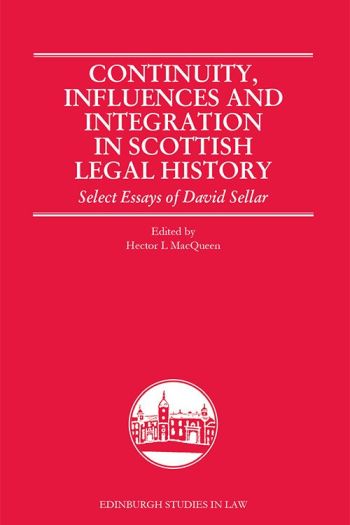Continuity, Influences and Integration in Scottish Legal History: Select Essays of David Sellar
ISBN13: 9781474488761
Published: December 2021
Publisher: Edinburgh University Press
Country of Publication: UK
Format: Hardback
This is a Print On Demand Title.
The publisher will print a copy to fulfill your order. Books can take between 1 to 3 weeks. Looseleaf titles between 1 to 2 weeks.
Brings together 15 principal essays by David Sellar (1941–2019), reflecting his pioneering contribution to Scottish legal history.
- Groups essays into topics, covering Celtic law and institutions, the influence of Canon and English law across a wide range of legal subjects (including family law, succession, criminal law, evidence) and customary law
- Includes a paper written during Sellar’s time as Lord Lyon King of Arms (2008–14) but left unpublished at his death, dealing with the history of the office of Lyon itself and arguing for its ancient Celtic origins
- Groups essays into topics, covering Celtic law and institutions, the influence of Canon and English law across a wide range of legal subjects (including family law, succession, criminal law, evidence) and customary law
- Includes a general introduction by Hector L. MacQueen assessing and contextualising Sellar’s contribution to the field
David Sellar was a pioneering historian of Scots law who rejected previous interpretations of the subject as a series of false starts and rejected experiments. He emphasised instead the continuity of legal development, with change a process of integration of external influences from very early times on. Sellar’s approach, articulated mainly through essays published in diverse places over four decades, significantly influenced our general understanding of legal history in Scotland as well as leading to appreciation elsewhere of its comparative significance.
By gathering Sellar's major essays in a single collection, this book demonstrates the scope and reach of Sellar’s overall contribution. It provides an opportunity to view Sellar’s work as a whole and to access his distinctive perspective on the overall trajectory of Scottish law.
